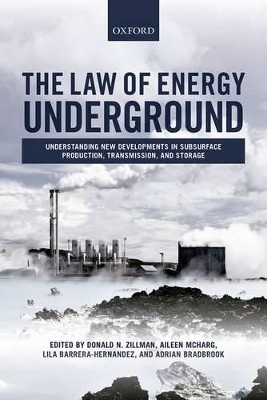
The Law of Energy Underground
Oxford University Press (Verlag)
978-0-19-870318-1 (ISBN)
While energy has been extracted from the ground for two centuries, recent years have seen transformative changes to how easy it is to access underground energy resources. This book investigates the key challenges and legal consequences of recent developments in the use of the subsurface as a source of energy. It provides a comprehensive analysis of the new technologies that have made this possible, such as the extraction of unconventional oil and gas resources through horizontal drilling and hydraulic fracturing, also known as fracking. Further developments include the expanded use of geothermal energy, which has the potential to beome a major renewable energy source. The subsurface can also be utilised for long-term disposal or storage of environmentally harmful by-products of energy use, such as carbon capture and storage (CCS), and disposal of spent nuclear fuel and other nuclear waste. Successful development of these technologies could enhance the use of fossil and nuclear energy by reducing the harm caused by the release of greenhouse gases and harmful radiation.
The authors bring together a wide variety of expertise and knowledge to examine the legal implications of the development and control of these underground activities. They provide an invaluable understanding of the legal frameworks applicable to the extraction of underground energy, both at the international level and in a number of important national jurisdictions. Importantly, the book analyses the different regulatory responses to these developments across five continents, and assesses in detail the environmental impact of new energy extraction technologies.
Donald Zillman has been a tenured faculty member at Arizona State University from 1974-79, the University of Utah from 1979-90, and the University of Maine School of Law from 1991 to the present, where he holds the Edward Godfrey Professorship at the Maine law school. His teaching and scholarship have concentrated on energy, environmental, and natural resources law and the constitutional governance of the military. At the University of Utah, he received the Law School's Burlington Northern Outstanding Teacher Award. His research has produced ten books and over 50 scholarly articles including in the leading legal journals of the University of Texas, Georgetown University, George Washington University, the University of North Carolina, and Notre Dame University. Aileen McHarg is Professor of Public Law at the University of Strathclyde. Professor McHarg's research relates to regulatory theory and practice, particularly in relation to energy utilities. She has written widely on UK and EU energy regulation, focusing on questions of institutional design, regulatory accountability, consumer representation, and the promotion of sustainable energy. She also has a developing research interest in the regulatory and governance challenges posed by climate change. Adrian Bradbrook is Professor of Law at Adelaide University. His main research work lies in the fields of sustainable energy law, environmental law, and property law. He has published extensively in these fields. He has held the position of Chair of the Working Group on Energy Law and Climate Change for the IUCN (World Conservation Union) and has worked on a number of UN projects relating to energy law. He is a Member of the Board of Editors of the Journal of Energy and Natural Resources Law, the Australasian Journal of Natural Resources Law and Policy, the Journal of Renewable Energy Law and Policy and the Australian Property Law Journal. Lila Barrera-Hernández is an Adjunct Assistant Professor and member of the Natural Resources Research Group, Faculty of Law, University of Calgary, Canada. She is also member of the Academic Advisor Group (AAG) of the International Bar Association, Section on Energy, Environment, Natural Resources and Infrastructure Law (IBA-SEERIL). She has published numerous books and articles on a variety of topics ranging from energy security to indigenous participation and land tenure in Latin America. She has over 12 years' experience in sustainable development practice. She has worked extensively in Latin America on environmental and energy development issues. Her experience covers a wide range of activities, including providing advice to governments on regulatory and institutional strengthening, training of government officers on different aspects of environmental law and practice, and participating in the preparation of strategic environmental assessments and sustainable development plans.
SECTION ONE: PROPERTY RIGHTS IN UNDERGROUND RESOURCES ; SECTION TWO: THE INTERNATIONAL LAW TREATMENT OF SUBSURFACE RESOURCES ; SECTION THREE: GOVERNING UNCONVENTIONAL OIL AND GAS EXTRACTION ; SECTION FOUR: ADDRESSING ENVIRONMENTAL AND SUSTAINABILITY ISSUES UNDERGROUND ; SECTION FIVE: RESOLVING UNDERGROUND RESOURCE CONFLICTS AROUND THE WORLD
| Verlagsort | Oxford |
|---|---|
| Sprache | englisch |
| Maße | 162 x 241 mm |
| Gewicht | 978 g |
| Themenwelt | Naturwissenschaften ► Biologie ► Ökologie / Naturschutz |
| Recht / Steuern ► EU / Internationales Recht | |
| Technik ► Elektrotechnik / Energietechnik | |
| ISBN-10 | 0-19-870318-X / 019870318X |
| ISBN-13 | 978-0-19-870318-1 / 9780198703181 |
| Zustand | Neuware |
| Haben Sie eine Frage zum Produkt? |
aus dem Bereich


